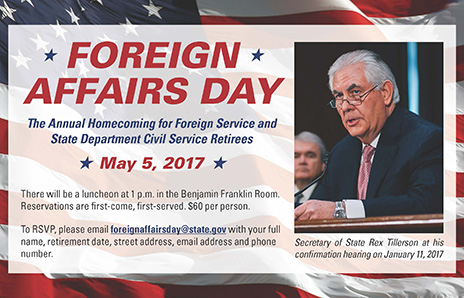DS at 100: A Tradition of Vigilance
The Diplomatic Security Service has evolved to safeguard American diplomacy and U.S. interests abroad.
BY BILL A. MILLER

The Department of State’s first chief special agent, Joseph “Bill” Nye, served from 1917 to 1920.
Library of Congress
Just over a century ago, in 1916, then-U.S. Secretary of State Robert Lansing created the Department of State’s first security office in recognition of the fact that the United States was transforming into a global power during the World War I era. Secretary Lansing referred to his security team as the Secret Intelligence Bureau, a lofty name for a single Foreign Service officer overseeing a handful of federal investigators on loan from the U.S. Secret Service and U.S. Post Office Department.
The new office’s mission was to prepare classified security reports and investigate covert activities within the United States such as espionage, passport fraud and sabotage of U.S. industry and transportation by the European powers then engaged in World War I.
In early 1917, as the United States prepared to enter the war, Congress granted the State Department legal authority to hire its own federal agents. Secretary Lansing then took the next step toward creating a security service: he appointed the department’s first chief special agent, a former Secret Service investigator named Joseph M. Nye.
Over the following decades, those earliest beginnings—a handful of investigators primarily based in New York—evolved into the Diplomatic Security Service.
DSS Today
Today, DSS is an integral part of the State Department, serving as its security and law enforcement arm. The men and women of DSS facilitate our work not only in Washington, D.C., and New York City, but in 29 other U.S. cities and at 275 U.S. diplomatic missions worldwide. DS personnel include more than 2,000 special agents, 220 security engineering officers, 160 security technical specialists, 100 diplomatic couriers, 120 Navy Seabees, 1,000 uniformed protective officers and guards, and more than 37,000 foreign guard and surveillance detection personnel.
We protect people, property and information. We are members of the Foreign Service, and we take seriously the fact that we live and work with those we enable and protect. DSS special agents, security engineers, diplomatic couriers and others risk their lives to provide a secure environment for the conduct of American diplomacy.
We are members of the Foreign Service, and we take seriously the fact that we live and work with those we enable and protect.
We’ve been using the phrase “a tradition of vigilance” to mark our centennial. Vigilance means more than just keeping our eyes open. Ideally, we are not just watchful or simply observant. We have to be ready to take action, often in dangerous or fast-evolving situations that directly threaten the safety of Americans. As the people who represent our nation conduct their essential work throughout the world, we know that danger could strike at any time. We expect it. We prepare for it. We plan for it and equip ourselves for it.
Meeting Evolving Needs
Over the past decade and a half, DSS has protected American diplomacy in increasingly challenging environments. We have supported frontline diplomacy in Iraq and Afghanistan, responded to the upheavals of the Arab Spring, coordinated multiple evacuations, and experienced scores of attacks on our embassies and missions—far too many of them deadly. Since the 9/11 terror attacks, there have been more than 290 significant attacks against U.S. diplomatic facilities and personnel. In that time, more than 90 security professionals—Americans and our foreign partners—have lost their lives protecting American diplomats.

In this photo taken during the early 1960s, Director of Security John Reilly (right) holds the cavity resonator listening device found a decade earlier inside a carved wooden image of the Great Seal of the United States that had been presented by Soviet officials to the U.S. ambassador to the USSR in 1948.
An unidentified special agent points to where the bug had been placed in the carving. Joseph Bezjian, an Office of Security technical officer, discovered the bug with the aid of Ambassador George Kennan in 1952.
Department of State
Every U.S. diplomatic mission in the world operates under a security program designed and maintained by the Diplomatic Security Service. DS personnel protect the Secretary of State wherever he or she may be, as well as foreign ministers and other high-ranking dignitaries visiting the United States. We also protect American athletes at international sporting events. We investigate passport and visa fraud and monitor insider threats and cybersecurity, as well as cyber infrastructure.
As DS meets the evolving security needs of the Department of State, the challenge of finding and vetting high-caliber personnel also increases. Each year, DS investigators conduct more than 30,000 background security clearance investigations for U.S. government employees.
In addition to state-of-the-art training for our own DS personnel to be leaders in their fields, every year we also train thousands of other members of the U.S. Foreign Service. As we have learned over past decades, and continue to learn, security is not just the responsibility of a few elite special agents. Soon every member of the Foreign Service heading overseas will receive some level of DS training. Recent attacks in the United States and Europe drive home the fact that even locations traditionally thought “safe” carry an inherent level of risk in the modern world of globally connected extremist groups.
Not that many years ago, being a DSS special agent meant wearing a suit and earpiece while discreetly carrying a weapon. But times and threats change. Today DSS operates on tactical, operational and strategic levels that were unimaginable a generation ago.
Tactically, we’re located at U.S. embassies and missions around the world; in our domestic field offices, resident offices and headquarters; and as liaisons across federal agencies. Operationally, we have a presence within FBI field offices, joint counterterrorism task forces, the National Counterterrorism Center, Department of Defense geographic combatant command headquarters, the Joint Interagency Task Force and Special Operations Command. At the strategic level, we have a presence in and regular interaction with the National Security Council, FBI headquarters, the Joint Staff and the Office of the Secretary of Defense.

Special agents monitor world events and overseas security from inside the Diplomatic Security Command Center in April 2014. Today the Command Center is a 24/7/365 facility with the ability to electronically monitor all U.S. diplomatic facilities around the globe.
Department of State
Maintaining Security Partnerships
Over the decades, we have developed security partnerships across the Defense Department, throughout federal agencies and, significantly, with literally hundreds of international organizations and foreign governments. Not just office calls, these are deep, multigenerational relationships around the globe, where DSS special agents and subject-matter experts work side by side with counterparts, rolling up their sleeves and doing the tough, critical business of security.
Using the latest advances in technology, including personnel emergency tracking devices, remote monitoring of U.S. diplomatic facilities and other communications systems, the DS Command Center is a critical component during the planning and execution of national security missions overseas. The Command Center serves as the conduit of information to the bureau, enabling it to make timely and well-informed decisions.
We also have long recognized that those who target the United States overseas do not focus exclusively on the U.S. government. American businesses and private-sector groups also work in dangerous environments. For more than three decades, Diplomatic Security’s Overseas Security Advisory Council has worked closely around the globe with the U.S. private sector—companies, non-governmental groups, faith-based organizations and academics—on real-time threat reporting, sharing information and in-depth security assessments.
Although there is no way to definitively know what threats we might face, from what actors, or even where such attacks might unfold, DS is prepared to be at the forefront of protecting Americans and American interests wherever they are challenged, just as we have done for the past century.
DS or DSS?
The U.S. Department of State has had a security office, including special agents, for more than a century. The Bureau of Diplomatic Security (DS) and the Diplomatic Security Service (DSS) however, were both created in 1985 and codified under U.S. law in the Omnibus Diplomatic Security and Antiterrorism Act of 1986.
Ever since, there has been significant overlap and confusion about the difference between DS and DSS.
In the simplest terms, a Senate-confirmed assistant secretary of State heads the State Department’s Bureau of Diplomatic Security. The bureau is responsible for overseeing State Department law enforcement, security and protection programs abroad and at home. DS also works with policymakers on diplomatic security matters, including responding to queries from Congress.
DSS, by comparison, is the day-to-day law enforcement and security operation within DS. Under the 1986 omnibus law, DSS must be headed by a career Senior Foreign Service or Senior Executive Service officer with demonstrated experience in security, law enforcement and public administration. The director of DSS also serves as principal deputy assistant secretary of State for DS, and is responsible for recruiting and overseeing the State Department’s special agents, security engineering officers, security technical specialists, diplomatic couriers and numerous other security professionals and support personnel.
In other words, DS promotes the mission, while DSS are the people who carry out that mission.
As the law enforcement and security arm of the U.S. Department of State, DS is responsible for providing a safe and secure environment for the conduct of U.S. foreign policy. As a federal law enforcement organization, DSS implements the State Department’s worldwide law enforcement and protective security mission.
In common usage, and in the conduct of diplomacy, there is no hard and clear line separating the two. Trying to define the boundaries of that line has, over the past three decades, led to many animated and passionate discussions among Diplomatic Security professionals and our numerous federal and international partners. We are all proud members of DS.
—B.A.M.









